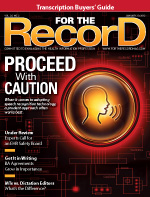 January 30, 2012
January 30, 2012
MT vs. Dictation Editor — What’s the Difference?
By Denise M. O’Neal
For The Record
Vol. 24 No. 2 P. 5
In more than a decade of transcribing, I had always been called a medical transcriptionist (MT), and I had never known the occupation to be termed anything else—until recently.
When I was hired for my present position a little more than three years ago, I was surprised when human resources (HR) handed me my ID and under my name was the title “dictation editor.” This tripped me up for a minute. I had no training nor was I qualified to be an editor. What’s more, according to the Oxford American Dictionary, an editor is a person who edits material for publication or broadcasting. My training was in medical transcription. Surely, the HR manager had made a mistake, but I dare not question her for fear she’d think I was trying to debate the polices set forth by such a fine and prestigious institution.
I went home clueless. I couldn’t stop thinking about my newfangled title and what it entailed. It wasn’t so much that it bothered me; it would just take some getting used to. It also got me thinking about the differences, if any, between being an MT and being a dictation editor. If there’s nothing to distinguish between the two, why not keep the tried-and-true MT moniker? A closer examination of the job descriptions revealed some interesting findings.
MTs are skilled typists who are excellent at interpreting what they read or hear. They’re well versed in the nuances of grammar, display a strong command of medical language and terms, and must be able to edit what they hear, then rearrange or tweak it to make it logical without changing relevant details or medical information.
Dictation editors compare the medical report generated by a voice recognition system to a doctor’s dictation, then edit the report as necessary to ensure 100% accuracy between dictation and text. Like MTs, they must be adept grammarians and have a strong grasp of medical language and terms.
The titles may be different, but the job descriptions are basically the same, with the exception being that the transcribing task is less strenuous for dictation editors because doing so from digital recordings is faster and less time consuming. The voice recognition system does most of the work, resulting in dictation editors performing more editing than they would in a traditional transcription setting, which in turn increases their production. For work-at-home transcriptionists/editors and on-site employees who are paid by the report, voice recognition is a boon to their pocketbooks.
So if there are no major differences between the job responsibilities of an MT and a dictation editor, why different titles? And why now? What has changed over the past 20 years in how medical reports are transcribed that would prompt the industry to turn the respected and prestigious title of “medical transcriptionist” into a misconceived notion that is barely recognizable by our peers? And colleagues aren’t the only ones unfamiliar with it. Type “dictation editor” into the search engines for Career Builder or Monster and “no jobs found” will be the result, while a search for “medical transcriptionist” will yield a plethora of listings.
In an attempt to uncover how the title of dictation editor originated, I paid a visit to the intelligent and knowledgeable HR staff where I work. Perhaps they had some insight into how the migration from MT to dictation editor occurred.
I spoke with the director of compensations, who specializes in position classifications and pay studies. One of her responsibilities is monitoring pay scales at other institutions to make sure our organization complies with changing laws and regulations. The company performs surveys and in-depth studies to come up with just the right title for a specific position. Who knew?
The process of selecting a title is based first on pay range and then on job description. According to HR’s research, the title of dictation editor is more marketable. In other words, it’s just a fancy name for medical transcriptionist that apparently generates a higher pay range these days. No arguments here.
Google the annual salary for an MT and a dictation editor in Chicago and the results yield $35,000 and $38,000, respectively. In this day and age when marketable—or is it salary generated?—titles carry significant weight, enterprising doctors may want to consider placing the initials MW (miracle worker) after their name instead of MD in an effort to give themselves a superficial way to boost their pay range.
To summarize, there really is no difference between an MT and a dictation editor as far as the acumen needed to perform the job—both have to be highly skilled and knowledgeable. Physicians count on each to be on top of their game, able to spot and correct dictation errors with the utmost of care. Conjunctions, prepositions, articles, pronouns, nouns, and verbs all need to be scrutinized in an effort to construct complete, coherent sentences. A simple typographical error such as a misplaced “and” or “but” could result in serious ramifications for doctors, MTs, and editors, not to mention patients. The institution itself is also at risk from a legal perspective.
Whichever title you prefer, there will always be a need for the services provided by MTs and dictation editors. Even reports generated via voice recognition systems need skilled professionals to analyze and correct content.
One final note: Don’t get used to the title dictation editor just yet. Search through Internet job postings and you may encounter the latest trend, a “more marketable” term that seems to be gaining steam in professional circles. Yes, “medical transcription editors” are becoming en vogue. Hopefully, the same people who created the title will also decide the job is worth twice the salary.
— Denise M. O’Neal is a 15-year veteran of the transcription industry and a freelance writer based in the Chicago area.



